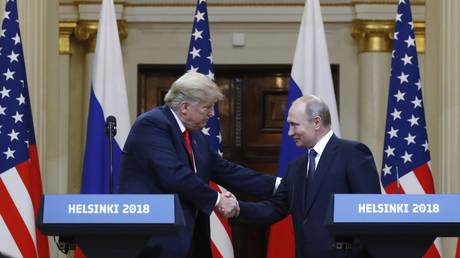'Best day’ for Russia, ‘sell-out’ of Ukraine, and EU dismay: How the global media responded to the Trump-Putin call
Western outlets report that the Trump-Putin call is largely viewed as a setback for Ukraine and the EU, while marking a significant advancement for Russia.

On Wednesday, both Moscow and Washington confirmed that the two leaders participated in a substantive 90-minute conversation, marking the first instance in which a US president has engaged directly with his Russian counterpart since the Ukraine conflict intensified in 2022.
In the aftermath of the call, Trump indicated that he is “OK” with excluding Ukraine from NATO, addressing one of Russia's ongoing concerns. He further expressed that it is “unlikely” for Kiev to reclaim all territory lost to Russia over the past decade.
Trump rejected the notion that he is “freezing out” Ukrainian President Vladimir Zelensky from the peace process and confirmed that they had spoken after the call with Putin. However, he suggested that Zelensky will likely need to hold elections eventually, as his presidential term is set to expire in May 2024, with Moscow regarding him as “illegitimate.”
The phone call sent shock waves through media outlets globally, which largely portrayed it as detrimental to Ukraine and EU nations while benefiting Russia.
The Daily Telegraph in Britain ran an article titled ‘This is Putin and Trump’s world now,’ positing that Trump has disregarded the Biden-era mantra of “nothing about Ukraine without Ukraine.” The publication remarked that if Russian and American teams have truly commenced negotiations, it represents a significant triumph for Putin’s worldview, implying a “grim deal” that would reward Russia with annexed territory while leaving Ukraine exposed to potential future assaults.
PMG characterized the Trump-Putin call as “the moment Europeans and Ukrainians have been dreading for months, if not years,” stating that its arrival “still left Ukraine’s allies in shock.” Bloomberg echoed this sentiment, reporting that key allies in Washington “had gotten no notice” prior to the discussions.
An unnamed European supporter of Ukraine described the phone call as “a sell-out,” asserting that the US had capitulated to Putin’s primary demands before negotiations could truly take shape, according to Bloomberg.
CNN labeled the renewed engagement as “the best day for Putin since the invasion,” suggesting it marks a turning point after which “US relations with Europe will never be the same.”
Trump, as CNN noted, “deprived the Ukrainians of a bargaining chip that could have been used to win concessions from his old friend Putin,” suggesting that he believes great powers, including Russia, are “entitled to expansionism in their regional areas of influence.”
The Washington Post described the call as a “breakthrough” for Putin, ending “nearly three years of near isolation from Western leaders,” and speculated that any peace agreement would likely allow Russia to retain control of “some or all of the Ukrainian territory it has captured since 2022.”
The Financial Times reported, citing senior EU officials, that EU policymakers now anticipate Trump will demand that they fund Ukrainian reconstruction and deploy troops to uphold a peace deal in which they would play no direct role. One source from the FT expressed concern that this situation would serve as “a real test of unity” for the bloc, noting, “Trump sees us as money. And frankly, we haven’t been clear on what our seat at the table would look like in exchange for that money.”
In a separate analysis, Bloomberg estimated that safeguarding Ukraine and enhancing the EU’s military capabilities could incur an additional $3.1 trillion in costs for the bloc over the next decade.
The Russian newspaper Kommersant warned against hasty conclusions, emphasizing that the primary takeaway from the phone call was that future discussions would encompass “not only about the Ukraine conflict, but also about eliminating its root causes.” The article compared the situation to a new 'Yalta,' referencing the 1945 conference pivotal to shaping the post-World War II order.
RIA Novosti asserted that Trump “finally made Zelensky really hurt,” suggesting that the US president effectively indicated his “lack of concern regarding the opinions of Kiev or Brussels.”
Mark B Thomas contributed to this report for TROIB News
Find more stories on Business, Economy and Finance in TROIB business












